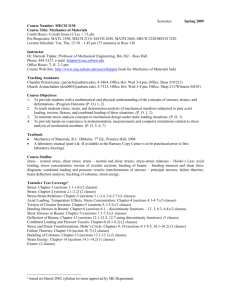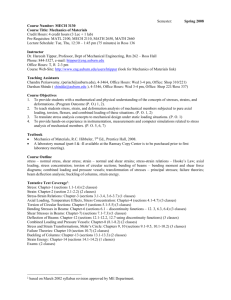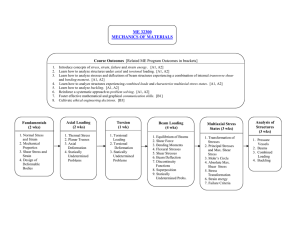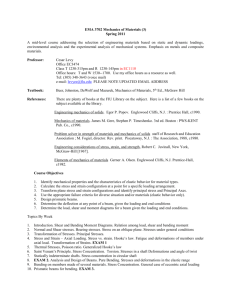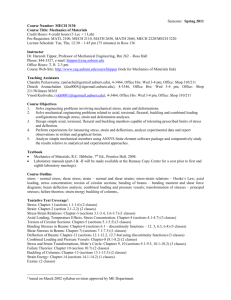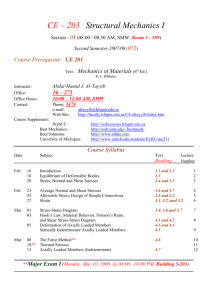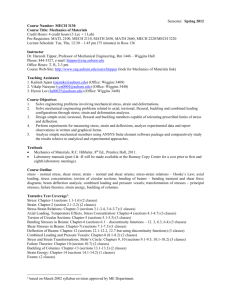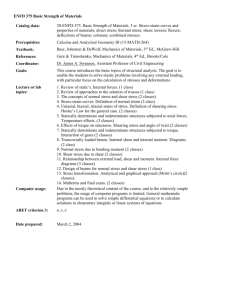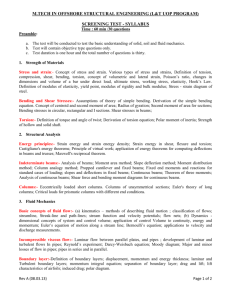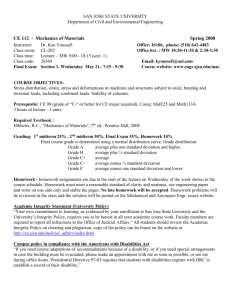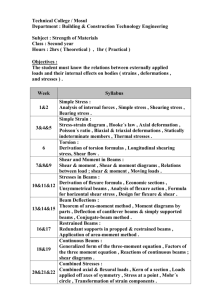Strength of Materials - York College of Pennsylvania
advertisement
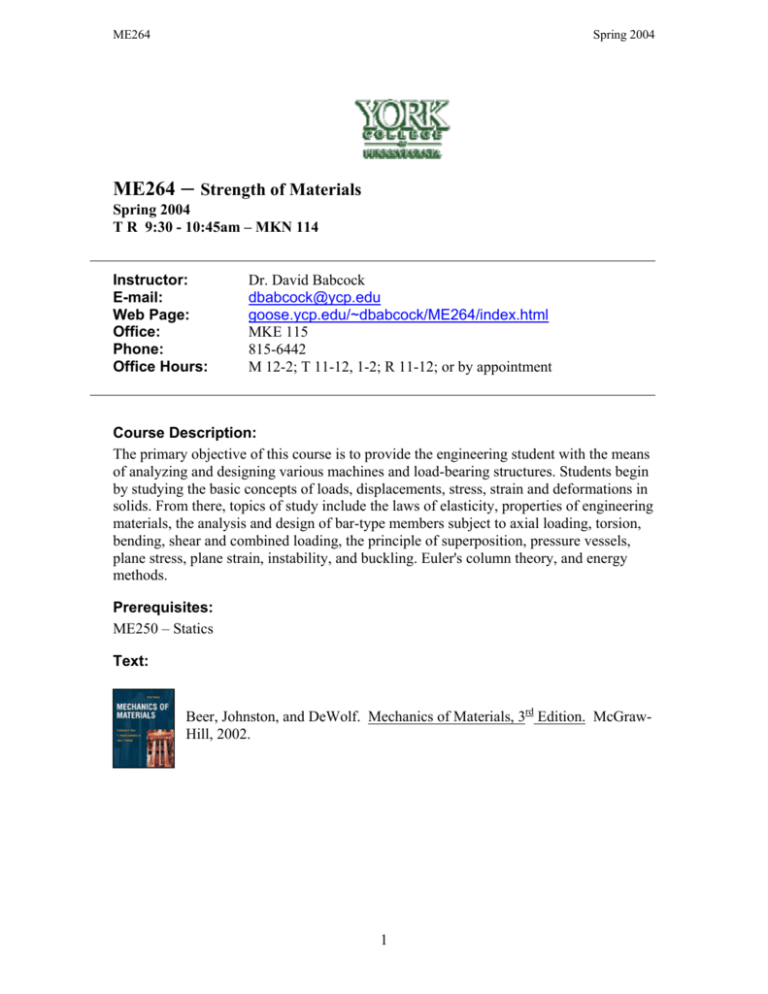
ME264 ME264 Spring 2004 – Strength of Materials Spring 2004 T R 9:30 - 10:45am – MKN 114 Instructor: E-mail: Web Page: Office: Phone: Office Hours: Dr. David Babcock dbabcock@ycp.edu goose.ycp.edu/~dbabcock/ME264/index.html MKE 115 815-6442 M 12-2; T 11-12, 1-2; R 11-12; or by appointment Course Description: The primary objective of this course is to provide the engineering student with the means of analyzing and designing various machines and load-bearing structures. Students begin by studying the basic concepts of loads, displacements, stress, strain and deformations in solids. From there, topics of study include the laws of elasticity, properties of engineering materials, the analysis and design of bar-type members subject to axial loading, torsion, bending, shear and combined loading, the principle of superposition, pressure vessels, plane stress, plane strain, instability, and buckling. Euler's column theory, and energy methods. Prerequisites: ME250 – Statics Text: Beer, Johnston, and DeWolf. Mechanics of Materials, 3rd Edition. McGrawHill, 2002. 1 ME264 Spring 2004 Course Objectives: • Introduce the concept of stress due to axial, torsional, and bending loads. • Compute the displacements (strain) due to various loadings. • Draw shear and moment diagrams to analyze stresses in beam members. • Use Mohr’s circle to transform stresses to different material planes. • Utilize singularity functions to represent stress and strain across a member. • Determine buckling in columns using Euler’s formula. Grading Policy: Grades will be based on a combination of homeworks, 3 exams, and a comprehensive final. • • • Homeworks – 20% 3 exams – 60% (20% each) Final exam – 20% No make-up exams will be given without approval of the instructor prior to class unless proof of extreme emergency or illness is provided. All exams will be closed book. A student earning better than 90% on all three exams may elect to not take the final (in which case the final exam grade will be the average of the other three exams). Homework will be collected at the beginning of class on Thursday for all problems assigned in the previous week. Late assignments will not be accepted. All homework must be done neatly on Engineering Computation paper (available in the bookstore) in a format similar to the sample problems in the textbook. Each student will be allowed to drop one homework assignment. Grading Scale Range Grade 100-90 89-80 79-70 69-60 59-0 4 3 2 1 0 Attendance Policy: Students are expected to attend all scheduled classes and read the appropriate text material prior to class. If a student must miss a class, it is his responsibility to notify the professor prior to class. Students are responsible for all material covered in class. 2 ME264 Spring 2004 York College Academic Integrity: Students are expected to maintain their integrity at all times. Although cooperative learning is strongly encouraged, all work submitted for grading must be a reflection of your knowledge of the subject. Academic dishonesty includes, but is not limited to, plagiarism; cheating; fabrication of results, information, or references; submission of another’s work as one’s own; or tampering with the work of another. Cheating on assignments and/or examinations will result in a “0” at minimum for all involved work and possible removal from the course at the discretion of the professor. A written report of the circumstances and disciplinary action will be provided to the student along with a copy forwarded to the Dean of Academic Affairs which may result in suspension from the college for repeat offenses. Students have the right to challenge any such actions through the normal appeals procedure. York College Communication Standards: York College recognizes the importance of effective communication in all disciplines and careers. Therefore, students are expected to competently analyze, synthesize, organize, and articulate course material in papers, examinations and presentations. In addition, students should know and use communications skills current to their field of study, recognize the need for revision as part of their writing process, and employ standard conventions of English usage in both writing and speaking. Students may be asked to further revise assignments that do not demonstrate effective use of these communication skills. Disclaimer: This syllabus is subject to change by the instructor. 3 ME264 Spring 2004 Tentative Course Outline Week Topic Jan 22 Stress Introduction Axial, Shear, and Bearing Stresses Factor of Safety Strain Hooke’s Law and Modulus of Elasticity Poisson’s Ratio Stress Concentrations Reading Assignment Ch. 1 1.1-1.4 1.5-1.10 1.11-1.13 Ch. 2 2.1-2.10 2.11-2.12, 2.14-2.15 2.17-2.19 Torsion Stresses and Deformations Angle of Twist Transmission Shafts Bending Elastic Deformations Members of Several Materials Ch. 3 3.1-3.4 3.5-3.6 3.7-3.8 Ch. 4 4.1-4.5 4.6 Jan 27-29 Feb 3-5 Feb 10-12 Feb 17-19 Feb 24-26 Exam I(Ch. 1-3) Feb 24 During Lab Period Stress Concentrations Eccentric Loading Unsymmetric Bending Mar 2-4 Mar 9-11 Mar 16-18 Mar 23-25 4.7 4.12 4.13-4.14 No classes – Winter Break Analysis and Design of Beams Shear and Moment Diagrams Singularity Functions for Shear and Moments Shear in Beams and Thin Walled Members Shear in Beams Shear in Thin Walled Members Transformations of Stress and Strain Stress Transformation Mohr’s Circle Mar 30-Apr 1 Exam II(Ch. 4-6) Mar 31 During Lab Period Apr 6-8 3-D Stresses Pressure Vessels Deflection of Beams Deflection of Beams Statically Indeterminate Beams Ch. 5 5.1-5.4 5.5 Ch. 6 6.1-6.4 6.6 Ch. 7 7.1-7.3 7.4 7.5-7.8 7.9 Ch. 9 9.1-9.3 9.5 No class Apr 8 – Spring Break Apr 13-15 Singularity Functions for Slope and Deflection Superposition 4 9.6 9.7-9.8 ME264 Spring 2004 Apr 20-22 Columns Euler’s Formula Centric Loading Eccentric Loading Apr 27-29 Exam III(Ch. 7,9-10) Apr 28 During Lab Period May 4-6 May 10-14 Principle Stresses Principle Stresses Combined Loading May 6 – Review for Final FINAL EXAM-Thursday May 13 8:00-10:00am 5 Ch. 10 10.1-10.4 10.6 10.7 Ch. 8 8.1-8.3 8.4
